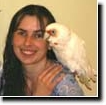Water Intake for Normal, Healthy Birds –
Various Species
Kristen Reeves, Meadowlark Farms Avian Supply, Inc.
Over the last 10-17 years (depending on length of time any particular species was kept), I’ve tracked everything from seed hulls to water intake and have referenced the water intake for normal, healthy birds – several species. Average temperature in my bird room ranges from 65-72 degrees during the spring, summer & fall months, 48-68 during the winter. Humidity is always a bit on the high side right around 50-55%, but often much higher because my bird room is located in the basement. I will occasionally run a dehumidifier when the humidity is higher than 55%, but not often. I prefer to allow the birds to acclimate to their environment and build up immunities to issues that would be present during high humidity time. These totals are taken only from my own aviary and may be very different in other aviaries.
In my aviary, every species drinks a different amount of water. I track it daily and keep detailed notes on clipboards attached to each cage. Birds in flights tend to drink less - no matter the species or mix of species – while pairs tend to drink more with or without chicks.
My specialty lies in Australian species so I have limited experience with African and Indo-Pacific species. I’ve recorded averages for species I have kept ONLY. I do not have averages for species beyond what is recorded below:
FINCHES & WAXBILLS -
- Gouldian - 1/2 oz per bird per day
- Society - 1/2 oz per bird per day
- Chestnut Breasted Mannikin - 1/2 oz to 3/4 oz per bird per day
- Star Finch - 3/4 to 1 oz per bird per day
- Zebra Finch – 3/4 to 1 oz per bird per day
- Cherry Finch - 1/2 oz per bird per day
- Shafttail Finch - 1/4 to 1/2 oz per bird per day
- Parson Finch - 3/4 to 1 oz per bird per day
- Blue Capped Cordon Bleu - 1/4 to 1/2 oz per bird per day
- Red Cheeked Cordon Bleu - 1/4 to 1/2 oz per bird per day
- African Silverbill - 1/4 to 1/2 oz per bird per day
- Owl Finch (Bicheno) - 1/4 to 1/2 oz per bird per day
- Lavender Waxbill – 1/4 to 1/2 oz per bird per day
- Red Billed Fire Finch (Senegal) – 1/4 to 1/2 oz per bird per day
- Cuban Melodious - 1/2 to 1 oz per bird per day
- Weaver (Red Bishop) - 1/2 to 1 oz per bird per day
- Strawberry - 1/4 to 1/2 oz per bird per day
- Canary - varies greatly from 1/4 oz to 2 oz per bird per day depending on variety and size
HOOKBILLS -
- Budgerigar – varies greatly from 1/2 to 4 oz per bird per day – mostly due to bathing in the water receptacle
- African Grey – approximately 6 oz per day
- Orange Cheeked Conure – approximately 4 oz per day
Taking into consideration that a medication or supplement may taste or smell bad, these amounts may vary greatly depending on what is added to the drinking water. Gouldians here, for example, will totally refuse to drink for up to 48 hours if they don't like the taste or smell. By then they are wobbly and looking dehydrated and will finally give in and drink, but in very small amounts averaging less than 1/4 oz. I have seen similar behavior in all of the species I've kept over the years, but to a lesser extent than with the Goulds.
These totals also change dramatically depending on the foods offered. Salt content and wet foods affect intake - changes in diet will also affect consumption, usually seeing it rise as much as 5x the norm until they’ve acclimated to the new diet, so obviously these totals may be very different from one aviary to the next. Overall health of the flock also plays a large role in consumption. In my experience ill birds, or those with mild issues, tend to drink more than those with strong immune systems and no outward signs of illness. And, of course, heat and humidity play a large role as well.
An important aspect of tracking water intake is observing whether a bird has received enough of a medication to actually stop an issue. In the past it has been a problem here, and what prompted me to begin tracking intake. Unless I closely monitor their intake, I may not know for sure they are getting enough. When I do not monitor the water intake, my only other recourse is to check droppings and run crop washes (depending on the issue) to ensure treatment has worked. I perform follow-ups at 3 days, 7 days and 10 days following treatment, and monitor water intake the entire time. But all water is tracked daily, regardless of health in the flock. ~k





